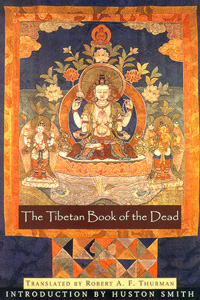The Tibetan Book of the Dead, Translated by Robert A. F. Thurman

The Tibetan Book of the Dead was written by the great master Padma Sambhava in the eighth or ninth century for Indian and Tibetan Buddhists, according to Thurman. This book seems to be a kind of instruction manual on how best to handle the state of being called ‘the between’ or ‘bardo’ by Tibetans. In fact, a better translation of the title would be “The Great Book of Natural Liberation Through Understanding the In-Between”. This in-between is explained as the state between death and the next life. It organizes the experiences of a recently deceased person into a rational process of psychic self-examination that leads to one of several outcomes for the person who has died.
This all pre-supposes several things. These things are concepts that are foundational to Buddhist teachings, and for the sake of brevity I will outline them here without any explanation. The reader is encouraged to research these teachings on their own if they feel so inclined:
When people’s physical bodies die, they are not really dead. Human beings are immortal and have other bodies which, even though they are invisible to us in the material world, actually do exist and enable us to continue the life cycle. The life cycle is the karmic life cycle that holds humanity captive until they liberate themselves from the wheel (cycle) by working off bad karma that they have accrued over many lifetimes. So where do people, in these invisible bodies, go when their physical bodies die? They go to the in-between, according to this ancient and highly revered book.
The Tibetan Book of the Dead is a set of instructions, meditations, and reminders for the recently deceased. These instructions are to be read in the presence of the person’s body during crucial time periods relative to their passing. For instance, there are instructions for the moment of passing, for day 1 after death, day 2, and so on. This also hints at a belief that a person who has recently died can still hear things in the immediate surroundings of their physical body for a period of time.
The in-between is described as the most momentous time in a person’s life cycle for many reasons. What happens at this time will affect their future lives and their spiritual evolution. One of the things I found really great about this book is that neither the author nor the book itself cares whether the deceased individual is Buddhist or any other religion, or even whether they believe in any deity. The aim is to help all human beings on their path to a better future, whether that future is rebirth in a new body, liberation from the karmic life cycle, or even Buddhahood. And it suggests that attainments like Buddhahood (a god-like state of perfection) is within the reach of all beings, even ones who might seem to be on the wrong path.
This is definitely not a book for those who have just begun to have questions about what happens after death, or for those with rigid mindsets regarding such things. There are lots of Sanskrit words, Tibetan and Indian names, and eastern concepts regarding consciousness that are a challenge to comprehend for western minds. And yet, if one takes certain details of what the after-death experience is purported to be like in this book and compares them to what other cultures and religions have to say about such things, one can find many interesting similarities. The author even mentions the Hollywood movie ‘Ghost’ as putting forth ideas that are consistent with the Tibetan Book of the Dead.
Though I would not say this book is a ‘page-turner’, I highly recommend this book to any serious seeker of knowledge about what happens to us when our physical bodies die.
